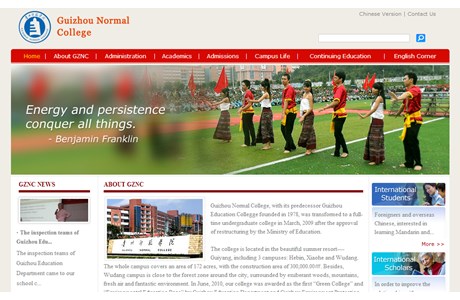Guizhou University for Nationalities

Guizhou University for Nationalities, also known as Guizhou Minzu University, is a public university in Guiyang, Guizhou Province, China.
The year is 1951, and China is taking a significant step towards fostering cultural diversity within its education system. In this context, a pioneering institution is born - a university specifically catering to the educational needs of ethnic minorities. This is the origin story of our university. The early years were dedicated to establishing a strong foundation for ethnic minority education. The curriculum was carefully crafted to celebrate and preserve the rich cultures and languages of the region. This involved offering courses in minority languages alongside traditional subjects. The university became a beacon of inclusivity, attracting students from various ethnic groups, creating a vibrant learning environment where students could share their heritage and build a sense of community.
Campus life at this university is a vibrant tapestry woven from the rich cultural backgrounds of its student body. Students have the opportunity to not only delve into their chosen academic fields but also to explore and celebrate the traditions of their peers. Cultural clubs and organizations provide a platform for students to share their heritage through music, dance, and storytelling. This fosters a sense of community and appreciation for the diversity that surrounds them. The university's motto, though not explicitly stated here, can be inferred from its mission. It likely emphasizes the importance of education in empowering individuals from all backgrounds and fostering a spirit of inclusivity. The motto might also highlight the university's commitment to preserving cultural heritage while preparing its students to thrive in the modern world.
Looking forward, the university has ambitious plans. It aspires to become a leading center for ethnic minority education, not just within the region but on a national and even international scale. This likely involves expanding research opportunities that explore and document the rich cultural traditions of various ethnicities. It might also encompass establishing exchange programs and collaborations with other institutions dedicated to cultural diversity. Ultimately, the university's future seems bright, with a focus on remaining a beacon of inclusivity and academic excellence for generations to come.
University Profile
Get a quick snapshot of the university's key details.
| University Name | Guizhou University for Nationalities |
|---|---|
| Name in Local Language | 贵州民族学院 |
| Year Established | 1951 |
Location
The university is located in Guiyang, Guizhou Province. Find the address of the university below.
| Address | Huaxi District, Guiyang, Guizhou Province, China |
|---|
Contact
Connect with the university easily! Find their contact details.
| Phone | +86 (851) 385 1289 |
|---|---|
| Website |

|
| Click here to send email | |
| More Links |
Admission Info
Find information below on admission to Guizhou University for Nationalities.
| Student Body | Men and Women |
|---|
Scholarship and Financial Aids
There is no information found on scholarships or financial aids offered by Guizhou University for Nationalities. You may like to visit their website for more details.
Related Articles
Stay informed with the following article related to the university or higher education in China.
